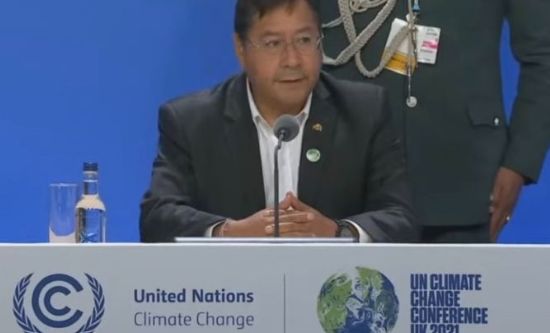
COP26 was an inevitable failure. Prior to the conference, in his address to the UN Assembly in New York on 22 September 2021, Boris Johnson stated that we could rely on ‘breakthroughs and investment that are made possible by capitalism and by the free market’ to resolve the climate catastrophe. These remarks encapsulate the position of the developed countries to the climate crisis that was brought to COP26. It was left to Cuba, Venezuela and Bolivia, three anti-imperialist countries, to lead by example and provide a real alternative to climate crisis in their addresses to COP, just as it was left to these countries to find political solutions to the climate crisis at the Cochabamba Conference in 2010 following the failure of COP15.
Bolivian and Cuban representatives to COP26 stressed that the climate crisis cannot be resolved within a capitalist framework. Cuban Minister of Science, Technology and Environment Elba Rosa Perez Montoya highlighted the need for a ‘redesign of the global financial architecture’, emphasising the pressure that the limitless accumulation of capital places on the planet. Bolivian President Luis Arce exposed imperialist leaders in their attempt to ‘impose their own rules of the game in the climate negotiations to continue feeding the new green capitalist system.’
Thirty years ago Fidel Castro was demanding that the imperialist countries ‘pay the ecological debt’ for their centuries of looting and plunder of the land and natural resources of the underdeveloped countries, rather than underdeveloped countries paying the foreign debt to the imperialist countries. Today, this remains a key issue standing in the way of sustainable development. Both Cuban and Venezuelan representatives at COP condemned the protectionism of the imperialist nations which restrict the development, not to mention the sustainable development, of poorer nations.
Bolivian representatives raised the issue of financing sustainable development at COP26 and have called for technological transfer to reduce uneven development, offering poorer countries resources to develop economically and sustainably. President Arce discussed the uneven development of poorer countries in an interview with The Canary explaining, ‘today development is more expensive for us [the underdeveloped world], but we also have the right to develop ourselves’.
All three anti-imperialist countries condemned the blockades and economic sanctions imposed by the US and its allies. Venezuela’s eco-socialism minister, Josué Lorca highlighted the limitations placed on sustainable development when countries are subject to the ‘unilateral coercive measures [that] are contrary to the basic foundations of International and Environmental Law.’ This was echoed in Montoya’s speech, in which she declared ‘[Cuba] reject[s] any measure that implies the exclusion or limitation on certain countries when it comes to receiving international funds to implement their [climate] obligations.’
Conferences like COP26, led by the imperialist countries, will rely on the cause of the climate crisis – capitalism – to try to resolve it. The RCG attended the Cochabamba conference in Bolivia in 2010, where it was agreed: ‘It is imperative that we forge a new system… in order for there to be balance with nature, there must first be equity among human beings’; this requires the ‘elimination of all forms of colonialism (and) imperialism.’
Destinie Sanchez
Fight Racism! Fight Imperialism! No 285, December 2021/January 2022




